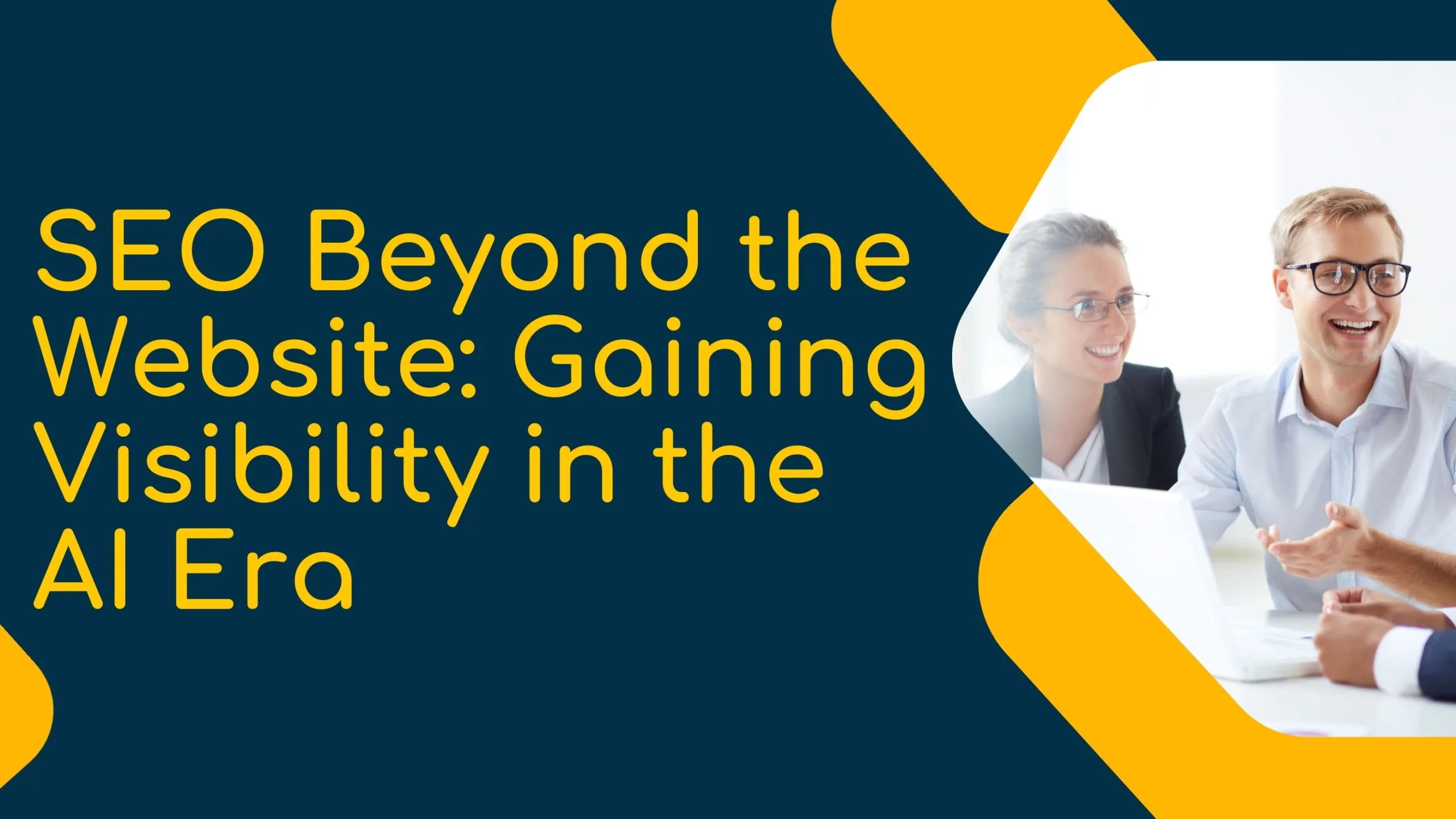AI-generated responses draw from a wide range of sources beyond your own site. To stand out, you must not only optimize your web pages but also secure visibility across trusted platforms, publications, and communities.
When was the last time you clicked from an AI response to a brand’s website? Probably not recently. That’s because tools like ChatGPT, Perplexity, and Google’s AI Overviews deliver answers directly, reducing the need for clicks.
Today, visibility depends on being cited in the trusted sources these systems pull from—not just on ranking high in search results.
For SEO teams, this shift means moving beyond execution. They must act as strategic partners across content, PR, product, data, and engineering, guiding how the brand gains visibility where audiences actually discover information.
Still skeptical? Keep reading to understand why SEO has evolved into a company-wide responsibility—and how businesses must adapt to stay relevant.
From Ranking to Referencing
Traditional SEO revolved around ranking—landing the top position often meant dominating attention.
But in the age of AI, answers are immediate. Tools like ChatGPT and AI Overviews compile responses from various sources, often without directing users to your site.
That means your brand might be mentioned, but your website may never be visited. The real measure of success is whether your product, message, or expertise appears in the AI’s output.
This requires a strategic reset. SEO is no longer just about search engine performance—it’s about shaping how your brand is represented across different ecosystems. Achieving this demands deeper collaboration with content, communications, product, data, and engineering teams. AI visibility is now a collective effort.
Where AI Sources Its Information
The first step in adapting is to know where AI tools gather their answers and why they prioritize certain sources. While much of this remains opaque, studies from Profound, Writesonic, XFunnel, and Rankscale highlight key platforms that dominate AI visibility today:
- Reddit – Its user-driven content and licensing deals with Google and OpenAI make it a favorite source. Join discussions authentically and engage where your brand naturally fits.
- Wikipedia – With its strict editorial standards, Wikipedia stands as one of the most authoritative sources. Ensure accurate, well-cited mentions of your brand or field, and if possible, establish a proper page.
- YouTube – Often overlooked, YouTube is not only a major search engine but also frequently referenced in AI responses. Use structured titles, metadata, and transcripts to maximize exposure.
- Quora & Niche Forums – Platforms like Quora, Stack Overflow, and expert communities provide valuable insights. Contribute credible answers under verified profiles to build authority and community presence.
- LinkedIn – Trusted for professional insights, LinkedIn frequently appears in AI results. Incorporate it into your content strategy by sharing clear, thought-leadership perspectives through brand representatives.
Review Platforms and Marketplaces
Sites like G2, Capterra, Trustpilot, and other industry-specific directories feature prominently in AI-generated answers, especially when users search for products or solutions.
To maximize visibility, make sure your profiles on these platforms are fully optimized and explore additional relevant directories where your brand can be listed.
Instagram
With Google now indexing some Instagram content, posts from this platform increasingly surface in AI Overviews—particularly for consumer-facing or local brands.
Ensure your images are supported by optimized text such as alt tags and captions, and keep your profile details accurate and up to date.
External Media and Listicles
Being included in “best of” articles, roundups, and reputable publications strengthens your brand’s credibility with AI tools.
Work on securing coverage from authoritative websites. In this landscape, digital PR has become a crucial strategy for improving visibility.
How SEO Can Collaborate Across the Business for AI Visibility
Achieving visibility in AI-driven results requires teamwork. SEO alone cannot secure citations in the sources trusted by AI tools—every department must contribute, from content and product marketing to PR, data, and engineering.
This shifts SEO’s role from execution to consultation. It’s no longer just about optimizing your own site—it’s about:
- Shaping broader strategy.
- Guiding discoverability on external platforms.
- Getting involved early in campaigns, product launches, and content creation.
Below are examples of how SEO can align with other teams:
Content Teams: Creating AI-Friendly Assets
- Focus on topics and formats that AI systems tend to reference (e.g., FAQs, summaries, Reddit-style explanations, expert roundups).
- Optimize headlines, structure, and metadata so content is easy to digest and summarize.
- Repurpose blogs into Quora answers or guest posts to gain authority mentions.
- Develop original, customer-focused pieces like listicles or use-case articles tailored to common challenges.
Expected Results: Platform-specific strategies, actionable feedback, and content that performs across channels.
Ultimate Goal: Assets that not only rank in traditional search but are also frequently referenced in AI-generated answers.
Product Marketing: Enhancing Discoverability with Naming and Positioning
- Use SEO and AI insights to guide product names and key messaging.
- Identify high-intent keywords for inclusion in “best tools for X” style listicles.
- Optimize listings on relevant marketplaces like G2, Capterra, or industry-specific platforms.
What to Expect: SEO input on messaging and tactics for boosting presence on third-party channels.
Ideal Outcome: Products that feature in AI-powered recommendations.
PR and Communications: Securing Trusted Mentions
- Suggest storylines and topics already driving interest in search.
- Target authoritative publications frequently favored by AI systems.
- Ensure mentions and backlinks are formatted in ways AI can process.
- Test outreach to publications that often appear in AI responses within your category.
What to Expect: Media strategies informed by search data and authoritative domain targeting.
Ideal Outcome: PR coverage that builds awareness while also improving AI visibility.
Research Teams: Turning Data into AI-Ready Citations
- Present insights with clear titles, quotable statistics, and concise summaries.
- Focus on filling search gaps or aligning with trending questions.
- Optimize research landing pages for shareability and external referencing.
- Share key stats on LinkedIn to test how they appear in AI summaries.
What to Expect: Editorial support to package research for wider distribution.
Ideal Outcome: Data that’s cited by journalists, industry writers, and AI tools.
Engineering: Keeping Your Site Accessible to AI
- Ensure pages are fast, crawlable, and indexable.
- Implement structured data, LLMs.txt, and IndexNow for improved AI and bot access.
- Track technical health continuously, not just during scheduled audits.
What to Expect: Clear technical roadmaps and diagnostic support.
Ideal Outcome: A website that search engines and AI models can reliably find, parse, and trust.
Customer Teams: Amplifying Proof Points
- Highlight and promote the strongest customer testimonials.
- Focus on third-party review platforms commonly referenced in AI results.
- Monitor how the brand is mentioned in Reddit threads and community discussions.
What to Expect: Guidance on which stories and platforms will deliver the greatest AI impact.
Ideal Outcome: Authentic, trusted social proof that AI tools can incorporate into responses.
Why These Partnerships Matter
These collaborations are most effective when SEO is involved from the start—helping shape campaigns, content, and assets before they launch, rather than after.
The Cost of Standing Still
When your brand isn’t discoverable in AI-driven answers, growth slows quietly. No new leads. No visibility where decisions are being made.
And it doesn’t appear as outright failure—it shows up as missed opportunities:
- You may rank well in search, but a competitor dominates AI summaries, Reddit discussions, YouTube breakdowns, and review roundups.
- You may release a strong product, but without searchable naming, it never surfaces in the right contexts.
- You may publish valuable research, but if it isn’t packaged for AI to reference, it goes unnoticed.
Falling behind today means being absent when the answer is generated—and that’s where influence and opportunity are lost.
Start Small, Shift Smart
Visibility today depends on being referenced by AI tools. That requires showing up on platforms you don’t control and in conversations you didn’t initiate.
Traditional SEO is still important, but it focuses too heavily on owned sites. To adapt:
Start small:
- Pick two or three platforms where your audience is most active—such as Reddit, YouTube, LinkedIn, or Instagram.
- Experiment with simple steps like optimizing transcripts, captions, or engaging in relevant discussions.
Shift smart:
- Join strategic conversations earlier.
- Collaborate closely with other teams across marketing, PR, data, and product.
- Influence brand visibility wherever decisions and discussions are happening.
The goal isn’t to replace everything you do in SEO—it’s to evolve your approach so your brand is part of the answers AI tools generate.
FAQs: SEO Beyond the Website in the AI Era
Q1. Why is SEO no longer just about websites?
AI-powered tools like ChatGPT, Perplexity, and Google AI Overviews gather information from multiple sources beyond your site. To stay visible, brands must be mentioned in trusted third-party platforms, communities, and publications.
Q2. Which platforms should I prioritize for AI visibility?
Focus on where your target audience is most active. Commonly referenced platforms include Reddit, YouTube, LinkedIn, Instagram, G2, Capterra, Wikipedia, and Quora.
Q3. How does AI decide which sources to use in answers?
While exact methods remain unclear, AI tools favor authoritative, well-structured, and widely cited sources—such as Wikipedia, trusted media outlets, review platforms, and active community discussions.
Q4. What role does traditional SEO play now?
Traditional SEO still matters for crawlability, rankings, and discoverability. But its scope must expand to influencing visibility across ecosystems where AI pulls answers, not just on SERPs.
Q5. How can different teams support AI-focused SEO?
- Content teams: Create AI-friendly content like FAQs, summaries, and expert roundups.
- PR teams: Secure mentions in authoritative publications.
- Product teams: Use search insights when naming or positioning products.
- Engineering: Ensure technical SEO keeps sites accessible to AI crawlers.
Q6. What’s the biggest risk of not adapting SEO for AI?
If your brand isn’t cited in AI answers, it risks becoming invisible at the exact moment users seek information. This leads to lost leads, missed brand mentions, and competitors dominating conversations.




